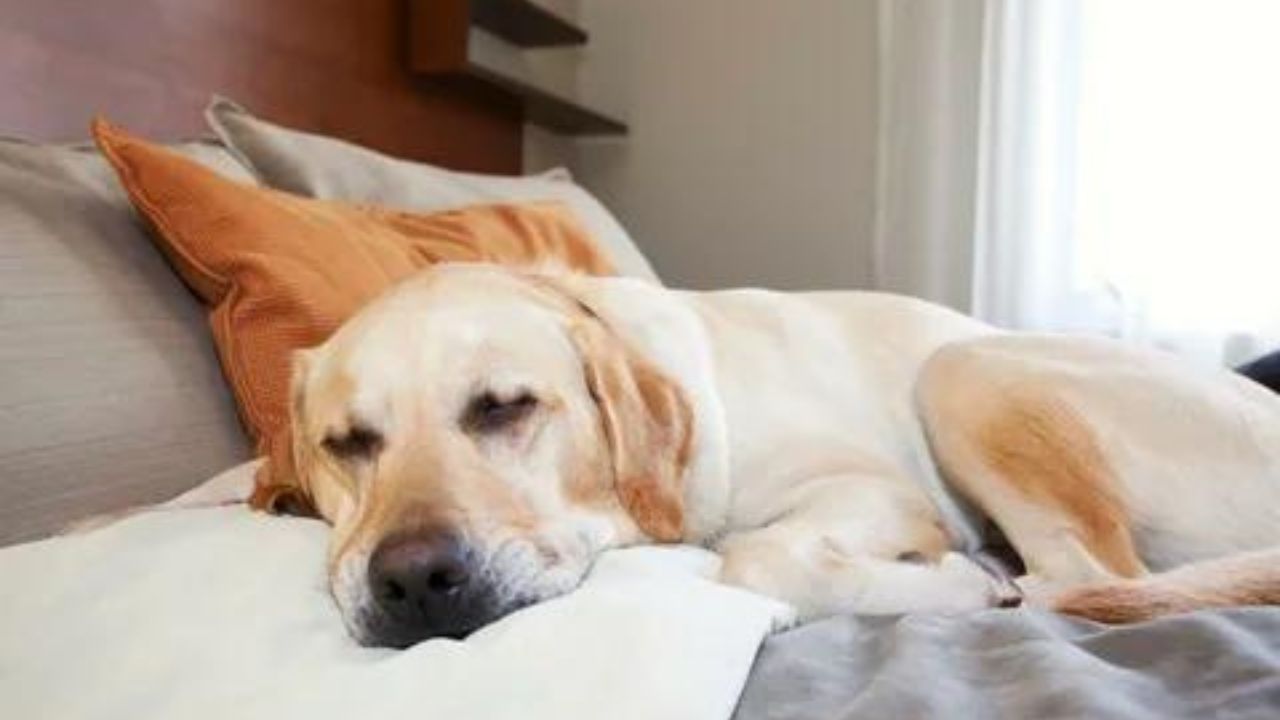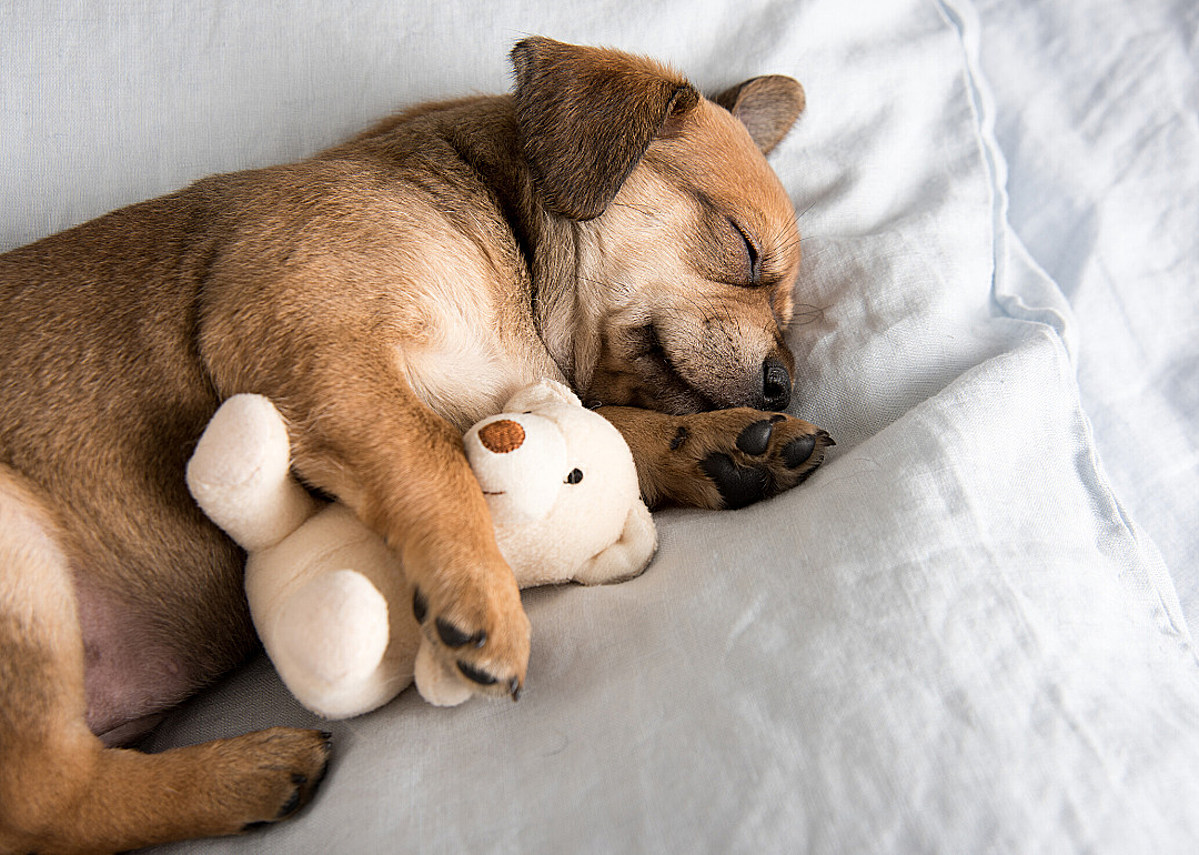
Do you feel like you’re constantly struggling to get your furry friend to settle down and go to sleep? If so, you’re not alone! Getting a puppy to sleep can be challenging, but puppies good sleep important for their health and well-being.
In fact, according to the American Kennel Club, puppies need anywhere from 18 to 20 hours of sleep per day. That’s a lot of snoozing! But getting your puppy to sleep well isn’t just a matter of avoiding late-night playtime – several factors can affect their sleep quality, from their sleeping environment to their feeding schedule.
Fortunately, there are plenty of strategies you can use to help your puppy get the rest they need. In this article, we’ll explore the importance of good sleep for puppies and some tips and tricks for helping them get the best sleep possible. So, please grab a cup of coffee and dive in!
How Long do Puppies Need to Sleep?
When it comes to sleep, puppies are like human babies – they need much of it! In fact, according to the American Kennel Club, puppies need anywhere from 18 to 20 hours of sleep per day. That might seem like a lot, but it’s important to remember that puppies are growing and developing physically and mentally.
During sleep, puppies’ bodies are hard at work repairing tissues, growing new cells, and regulating their hormones. Their brains are also busy processing all the new information they’ve learned daily, from social cues to basic obedience commands. And because puppies have such high energy levels when they’re awake, they need plenty of sleep to recharge their batteries and be ready for their next round of playtime.
It’s worth noting, however, that not all puppies will sleep the same amount. Some may need closer to 20 hours of sleep per day, while others may do just fine with 18. Factors like breed, age, and overall health can all affect how much sleep a puppy needs.
So, how can you tell if your puppy is getting enough sleep? One of the easiest ways is to observe their behavior. A well-rested puppy should be alert and energetic when awake but also able to settle down and rest when it’s time to sleep. If your puppy seems overly lethargic or hyperactive, it could be a sign that they’re not getting enough rest.
Of course, if you’re ever concerned about your puppy’s sleep habits or overall health, it’s always a good idea to talk to your veterinarian. They can help you determine if your puppy’s sleeping habits are normal for their age and breed and offer tips for helping them get the rest they need.
Puppy Sleep Chart by Age
As a puppy parent, one of the most important things you can do is ensure your furry friend gets the right amount of sleep for their age. While every puppy is different, there are general guidelines you can follow to make sure they’re getting enough rest to grow and develop properly. Here’s a puppy sleep chart by age to help you know what to expect:
Newborn puppies (0-2 weeks): During this stage, puppies will spend most of their time sleeping, with brief periods of waking up to the nurse. They may sleep up to 22 hours per day.
Two to four weeks: Puppies will begin to become more active during this stage but will still need around 20 hours of sleep daily.
Four to eight weeks: Puppies will start to play and explore more during the day but should still sleep for 18 to 20 hours daily.
Eight to twelve weeks: Puppies will start becoming more active and energetic during this stage but should still sleep for 18 to 20 hours daily.
Three to six months: Puppies will continue to need a lot of sleep during this stage, with 16 to 18 hours per day being recommended.
Six to twelve months: Puppies may need slightly less sleep during this stage but should still be getting around 14 to 16 hours of sleep per day.
It’s important to remember that these are general guidelines, and your puppy may need more or less sleep than recommended for their age. Factors such as activity level, breed, and overall health can also affect how much sleep your puppy needs.
Why Puppies Need Good Sleep
Puppies need good sleep for a variety of physical and mental reasons. Just like humans, sleep is essential for puppies’ growth and development. During sleep, the body releases hormones that promote tissue growth and repair, and the brain consolidates memories and processes information. For puppies, sleep is critical for their physical and cognitive development.
In addition to these benefits, good sleep supports puppies’ immune systems. Studies have shown that sleep deprivation can lead to a weakened immune system and increased susceptibility to illness. Puppies are particularly vulnerable to illness, as their immune systems are still developing. Ensuring your puppy gets enough sleep is one way to help support their immune system and keep them healthy.
Another reason why puppies need good sleep is to support their emotional well-being. Sleep plays a crucial role in regulating mood and emotions. A lack of sleep can lead to mood swings, irritability, and even anxiety for puppies. On the other hand, good sleep can help puppies feel calmer and more content.
Good sleep is essential for puppies’ growth, development, and well-being. By understanding the importance of sleep for puppies, you can ensure your furry friend gets the rest they need to thrive.
Signs of Good Sleep in Puppies
It’s important to ensure your puppy gets good quality sleep, but how do you know if they’re resting well? Luckily, several signs can indicate whether your puppy is getting the rest they need.
Foremost, a puppy getting good sleep will look relaxed and peaceful. Their breathing will be slow and steady, and their body will be comfortable. You might notice their limbs are loose, floppy, or snuggled against a cozy blanket or toy.
Another key sign of good sleep in puppies is that they’ll be less reactive to outside stimuli. In other words, they won’t necessarily wake up or startle if you walk by or make a noise. This is because when puppies are in a deep sleep, they’re less responsive to their surroundings. On the other hand, if your puppy is constantly waking up or easily disturbed, it could be a sign that they’re not sleeping deeply enough.
You may also notice that your puppy is dreaming during their sleep. This can manifest in various ways, such as twitching, pawing, or making soft noises. While it might look like your puppy is uncomfortable or in distress, dreaming is a normal part of the sleep cycle for humans and animals.
Lastly, it’s important to note that puppies may have different sleep patterns depending on their age and breed. For example, larger breeds tend to sleep more than smaller ones, while younger puppies require more sleep than older ones.
Tips for Helping Puppies Sleep Better
Getting your puppy to sleep soundly can be daunting, but with some effort and patience, you can help your furry friend get the rest they need. Here are some tips for helping puppies sleep better:
Create a Comfortable Sleeping Environment
Creating a comfortable sleeping environment is one of the most important factors for getting your puppy to sleep well. Choose a quiet, dark, and cozy spot for your puppy, such as a crate or a designated sleeping area. Ensure your puppy’s sleeping area is clean and comfortable with a soft, cozy bed appropriate for their size and breed.
Establish a Bedtime Routine
Establishing a consistent bedtime routine can also help your puppy get better sleep. Consider setting a specific time each night for your puppy to go to bed, and stick to that schedule as much as possible. Before bedtime, engage your puppy in calming activities, such as a short walk or gentle playtime.
Tire Your Puppy Out Before Bed
Puppies are full of energy; they’ll likely have trouble settling down at night if they’re not tired enough. Ensure your puppy gets plenty of exercise throughout the day, such as regular walks or play sessions. Consider taking your puppy on a long walk or run before bedtime to help them feel more relaxed and ready for sleep.
Avoid Late-Night Feeding
Feeding your puppy too close to bedtime can interfere with their sleep. Make sure to feed your puppy at least a few hours before bedtime, and avoid giving them any treats or snacks that contain caffeine or sugar, as these can disrupt their sleep.
Reduce Noise and Distractions
Puppies are easily distracted by noises and other stimuli, making sleeping difficult. Consider using white noise or other calming sounds, such as soft music or a fan, to help drown out distracting noises. Additionally, consider limiting your puppy’s exposure to screens and other electronic devices before bedtime, as the blue light can interfere with their sleep.
Stick to a Consistent Sleep Schedule
Dogs thrive on routine, so it’s important to establish a consistent sleep schedule for your puppy. Try to put them to bed at the same time every night, and wake them up at the same time every morning. This will help regulate their sleep patterns and make it easier for them to fall asleep at night.
Following these tips can help your puppy get the rest they need to stay healthy and happy. Remember, puppies need plenty of sleep to grow and develop properly, so it’s important to prioritize sleep in your furry friend’s routine.
Common Sleep Issues in Puppies
While puppies need a lot of sleep, they don’t always make it easy for themselves – or their owners! Here are some common sleep issues that puppies may experience and some tips for addressing them.
Restlessness: Does your puppy toss and turn all night? Restlessness can indicate discomfort or anxiety, interfering with good sleep. To help your puppy feel more at ease, consider investing in a comfortable bed with adequate support. You might also try calming music or using a white noise machine to create a soothing environment.
Interrupted sleep: Puppies are known for their boundless energy, but even the most energetic pup needs to rest. If your puppy wakes up frequently throughout the night, it may be a sign that they’re not getting enough exercise during the day. Make sure your pup has plenty of opportunities to play and run around, and try to schedule their last meal of the day a few hours before bedtime to avoid late-night digestive issues.
Excessive barking: If your puppy is barking up a storm every time you try to get them to settle down, it could be a sign of separation anxiety or fear. To help your puppy feel more comfortable, try creating a safe and secure sleeping area that’s away from any sources of noise or distraction. Consider leaving a comforting item, like a favorite toy or blanket, in their bed.
Snoring: While snoring can be a cute and endearing trait in some dogs, it can also be a sign of underlying health issues. If your puppy snores loudly or frequently, it may indicate a respiratory problem or sleep apnea. Talk to your vet about any concerns, and consider investing in a high-quality bed that helps keep your puppy’s airways open during sleep.
Health Issues Related to Poor Sleep in Puppies
Poor sleep in puppies can lead to a variety of health issues, both physical and mental. Just like humans, puppies need sufficient sleep to function properly and stay healthy. When they don’t get enough rest, their bodies and minds can suffer in many ways.
One of the most obvious consequences of poor sleep in puppies is fatigue. Just like humans, puppies can become lethargic, irritable, and have trouble focusing when they don’t get enough rest. This can make it difficult for them to learn new behaviors and can even impact their long-term health if it becomes chronic.
Poor sleep can also lead to a weakened immune system. When puppies don’t get enough rest, their bodies may not have enough time to repair and replenish the cells that fight off infections and diseases. This means they may be more susceptible to illnesses, which can be especially dangerous for young puppies with underdeveloped immune systems.
In addition to physical health issues, poor sleep in puppies can also impact their mental well-being. Puppies who don’t get enough rest may experience anxiety, depression, and other behavioral issues. They may become overly reliant on their owners or exhibit destructive behaviors, such as chewing or digging.
It’s important to note that some puppies may have sleep issues due to underlying medical conditions, such as sleep apnea or epilepsy. If you suspect that your puppy is experiencing sleep issues beyond the norm, it’s important to consult with a veterinarian.
Conclusion
Congratulations! You’ve now learned some great tips and tricks for helping your puppy get the restful sleep they need. By creating a comfortable sleeping environment, establishing a consistent routine, and providing plenty of opportunities for exercise and play, you can help your furry friend get the most out of their slumber.
By prioritizing your puppy’s sleep, you’re ensuring their well-being and helping to create a happier, more harmonious home. A well-rested puppy is likelier to be calm and content, making them easier to train and more enjoyable to be around. And let’s be honest, a well-rested owner will likely be happier, too! Finally, Thanks for staying with us.








